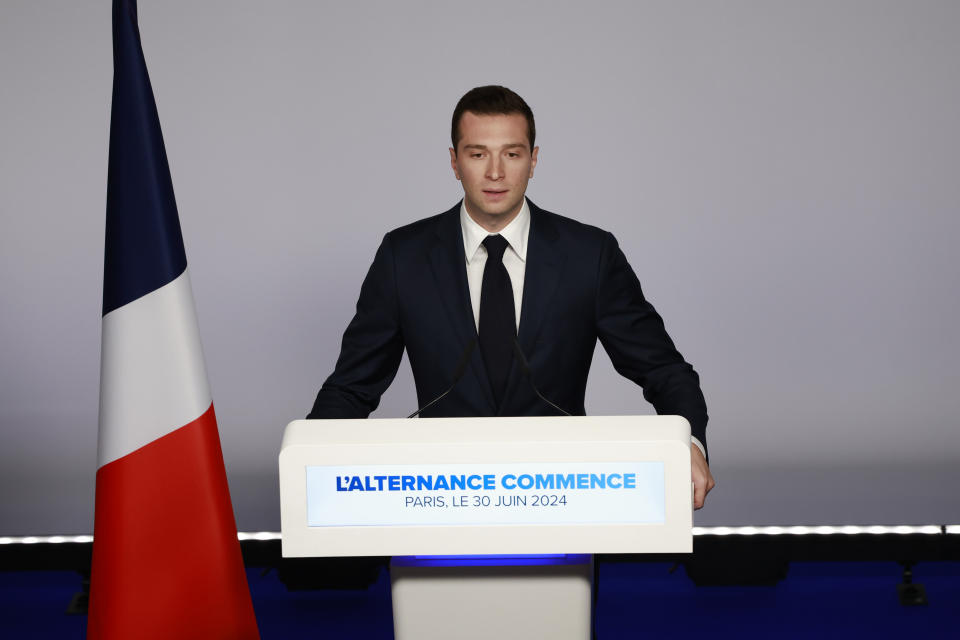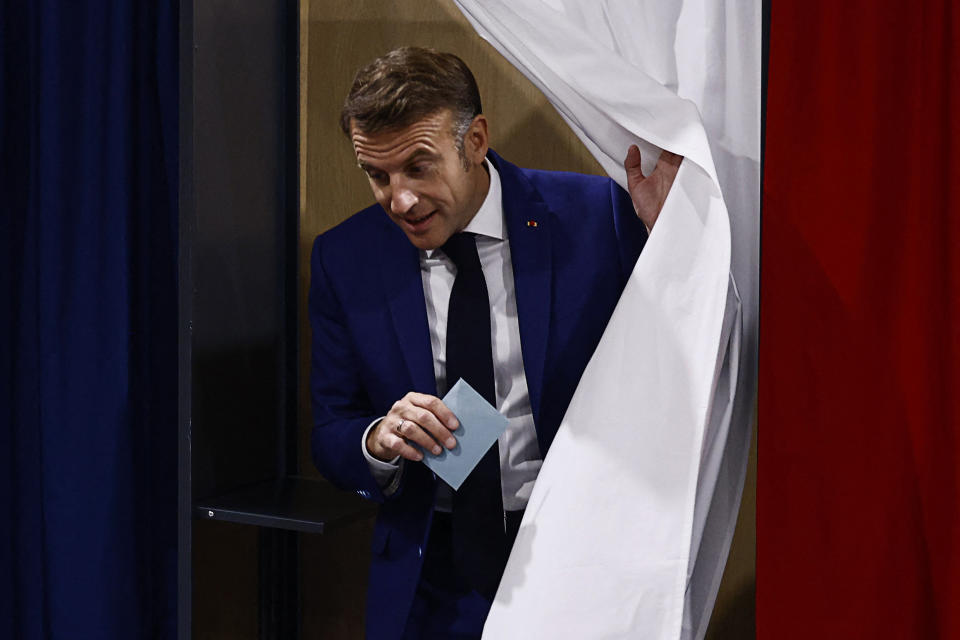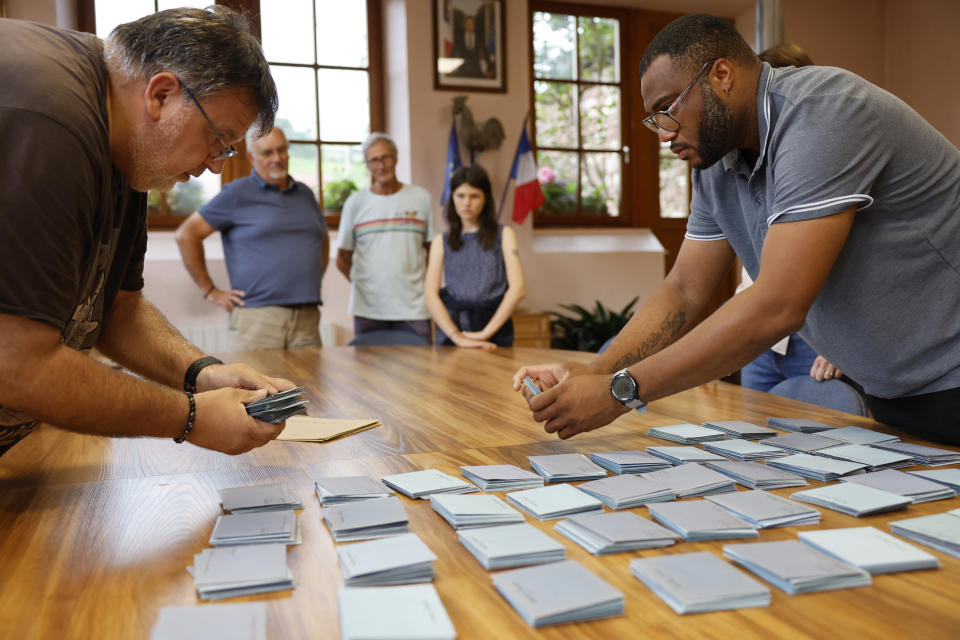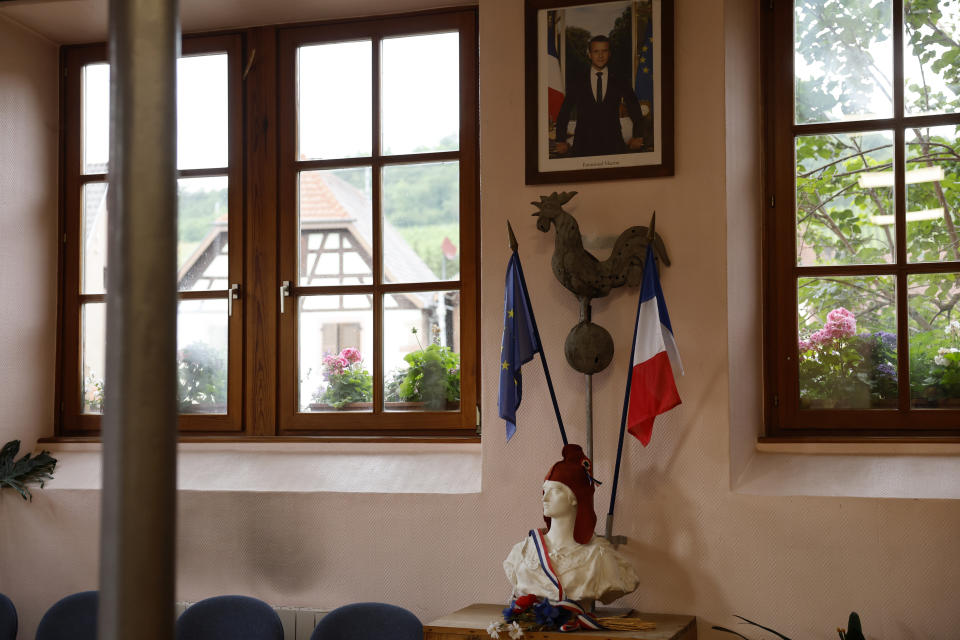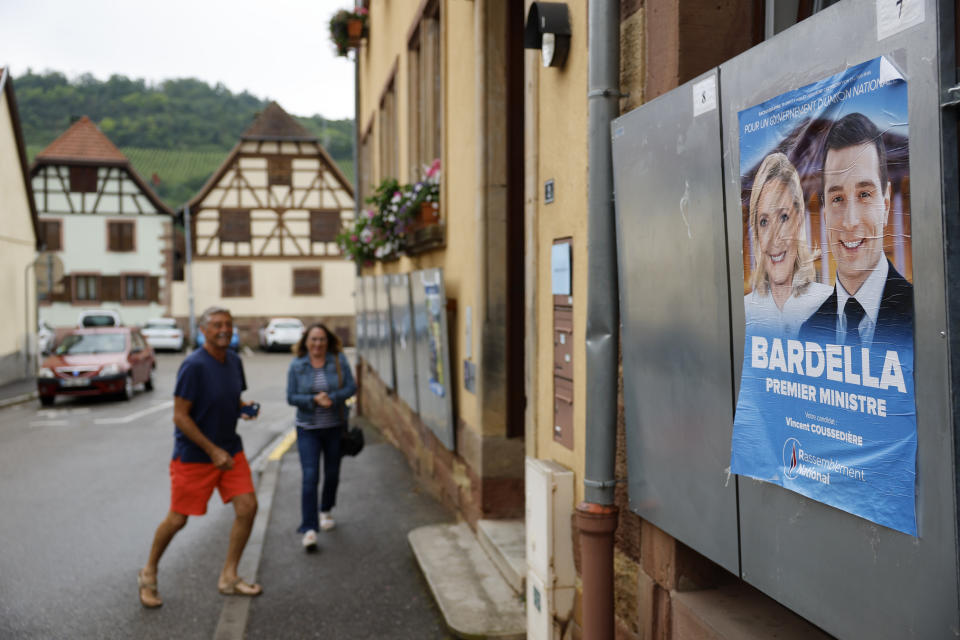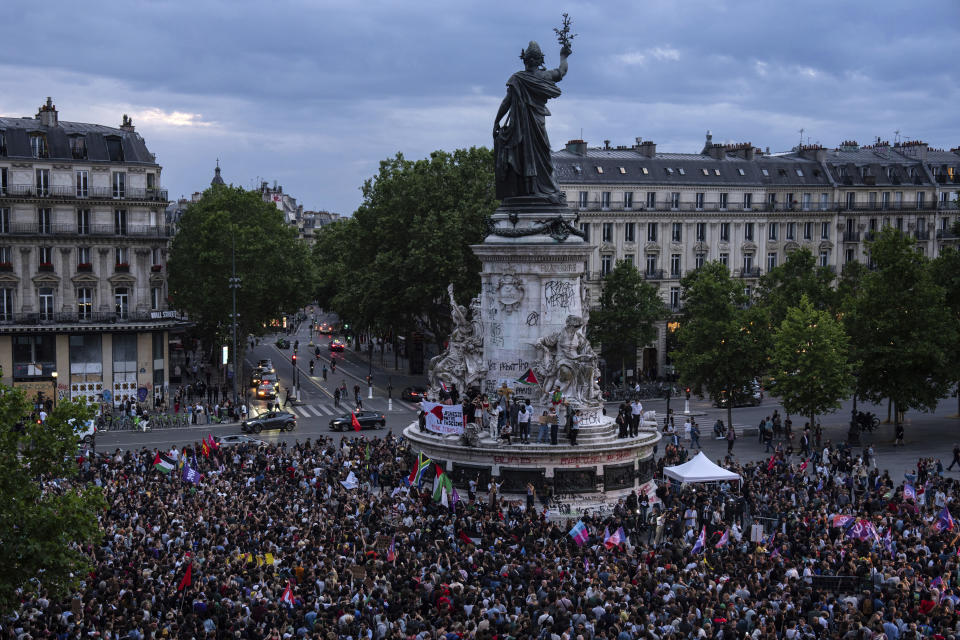The Latest | France's first-round voting ends. Bardella calls for rejection of 'dangerous far left'
France held the first round of an early parliamentary election on Sunday that could bring the country's first far-right government since Nazi occupation during World War II.
The second round will come on July 7. The outcome of the vote is highly uncertain. Turnout is unusually high.
Three major political blocs are: The far-right National Rally, President Emmanuel Macron’s centrist alliance and the New Popular Front coalition that includes center-left, greens and hard-left forces. The French system is complex and not proportionate to nationwide support for a party.
After the far right’s crushing victory in the European Parliament election earlier this month, Macron called an early vote in France because he otherwise feared the results would lead to paralysis in the legislature.
If the National Rally wins a parliamentary majority, Macron would be expected to name 28-year-old National Rally President Jordan Bardella as prime minister in an awkward power-sharing system known as “cohabitation.” Bardella said he would oppose sending French troops to Ukraine — a possibility Macron hasn't ruled out — and refuse French deliveries of long-range missiles and other weaponry capable of striking targets within Russia.
Currently:
— France is facing an election like no other. Here’s how it works and what comes next
— Macron weakened at home and abroad as an early French election gives the far right momentum
— In France’s high-stakes legislative election, a Jewish candidate faces and fights hate and division
— French far-right leader Bardella seeks to reassure voters, EU partners on economic, foreign policies
— French prime minister seeks to step out from Macron’s shadow in the upcoming early election
Here’s the latest:
Thousands gather in Parisian plaza to protest far-right National Rally party
Thousands of people gathered at Paris’ République plaza to protest the far-right National Rally, which came out strongly ahead in first-round legislative elections.
Among them was Cynthia Fefoheio, a 19-year-old political science student.
“We are going towards the extreme. People don’t understand that this will impact us for years and years. This is a France of hate that is growing, not a France of solidarity and union,” Fefoheio said.
Many in the crowd, which grew by the minute late Sunday, despaired for next week’s runoff election, which will decide the makeup of parliament and who will be the prime minister. National Rally was in a strong position already to control the powerful lower house of parliament, which would put a prime minister in place fundamentally opposed to French President Emmanuel Macron’s policies both at home and abroad.
“Maybe he can appeal for a vote against the far-right. I hope, I hope for a union between the right and the left,” said Daniel Gwendal, a 23-year-old public worker.
Attal urges voters to prevent far right from obtaining an absolute majority in Parliament
PARIS — French Prime Minister Gabriel Attal called on voters to prevent the far right from an absolute majority in parliament.
French President Emmanuel Macron, who named the 35-year-old Attal as France’s youngest prime minister in January, dissolved parliament and called the surprise elections after the National Rally’s strong showing in European elections in June.
“Not a single vote must go to the National Rally. France does not deserve that,” said Attal, standing in front of the prime minister’s residence.
The far-right party came out ahead in Sunday’s first round with about a third of the vote, and a left-wing alliance came in second. Macron’s alliance came in third, forcing his party and others into strategic decisions. Among them, Attal said, is that candidates in the president’s centrist alliance who came in third will step down before the runoff on July 7.
Bardella calls on voters to choose National Rally over a ‘dangerous far left’
PARIS — French far-right leader Jordan Bardella, who could become prime minister if his National Rally wins a majority in the parliamentary election, called on voters to choose his party over a “dangerous far left.”
Bardella spoke shortly after the party’s top figure Marine Le Pen implored voters to give the National Rally an “absolute majority” in parliament.
Polling projections say French voters have propelled the party to a strong lead in Sunday’s first-round legislative election, ahead of a left-wing coalition that includes center-left, greens and hard-left forces.
“The choice is clear,” Bardella said, accusing the leftwing coalition to campaign for “disarming the police,” “opening wide the doors for immigration” and criticizing leftist leaders for “insulting institutions and anyone who thinks differently from them.”
Bardella said “the time has come to put leaders at the head of the country who understand you.”
Far-right leader asks France to give her party ‘absolute majority’ in parliament
French far-right leader Marine Le Pen is calling on voters to give her National Rally an “absolute majority” in parliament as polling projections say French voters have propelled the party to a strong lead in Sunday's first-round legislative election. French President Emmanuel Macron is urging voters to block the far right in the decisive second round on July 7.
“The French have almost wiped out the ‘Macronist’ bloc,” Le Pen said after polls closed. She said the results show voters’ “willingness to turn the page after seven years of contemptuous and corrosive power.”
She said a National Rally majority would enable the far right to form a new government with the party’s president Jordan Bardella as prime minister in order to work on France’s “recovery.” Macron has said he won’t step down before his presidential term expires in 2027. The power-sharing system known as “cohabitation” would weaken him at home and on the world stage.
Polling projections say far-right National Rally has a strong lead
Polling projections say French voters have propelled the far-right National Rally to a strong lead in the first-round legislative election on Sunday and plunged the country into political uncertainty.
French President Emmanuel Macron called the surprise election just three weeks ago and is urging voters to rally against the far right. Projections by polling agencies suggest the National Rally stands a good chance of winning a majority in the lower house of parliament for the first time with an estimated one-third of the first-round vote. That's nearly double their 18% in the first round in 2022.
The National Rally is building on its success in the European Parliament election weeks ago that prompted Macron to dissolve parliament and call the vote. The second round of voting is on July 7. Macron could end up sharing power with a prime minister who is hostile to most of his policies.
In a National Rally stronghold, residents call party ‘less scary’ now
HENIN-BEAUMONT, France — Residents in a stronghold of France's far-right National Rally party say its politicians have made an effort to become more voter-friendly after years of fighting pariah status.
Magali Quere says she was born and raised in the former mining town of Henin-Beaumont and would cast her first vote for the far right on Sunday. She says things have changed for the better since a mayor from the National Rally took power in 2014. The city is cleaner and police regularly patrol the streets.
Quere says the days of former far-right leader Jean-Marie Le Pen years ago were “scary," but his daughter Marine Le Pen regularly visits the local food market and shakes hands with everyone, including people of color.
Murielle Busine says she won't “go as far as voting for the far right” but also praised the work of Mayor Steeve Briois and how accessible he is. “I cannot deny everything he has done for the city,” she said.
Turnout is unusually high three hours before polls close
The first round of France's high-stakes legislative election is seeing an unusually high turnout of 59% with three hours to go before polls close. That’s 20 percentage points higher than the turnout at the same time in the last first-round vote in 2022.
President Emmanuel Macron called the surprise vote three weeks ago after European Parliament election showed a collapse in support for his centrist party and a sharp rise for the far-right National Rally. Two rounds of voting will determine who will be prime minister and which party controls France’s lower house of parliament. That could potentially put France in uncharted political territory if Macron must share power with a party hostile to most of his policies.
Some pollsters suggest the high turnout could temper the outcome for the hard right National Rally, possibly indicating that voters made an extra effort to come out for fear that it could win.
Macron, Le Pen and others cast their votes
French President Emmanuel Macron and other candidates across the political spectrum have voted in the country's parliamentary election after Marine Le Pen’s anti-immigration National Rally party dominated pre-election opinion polls.
Turnout at midday in the first round of the two-round election stood at 25.9 % according to France's interior ministry. That's higher than the 18.43% at midday two years ago in the 2022 legislative election.
The second round of voting is July 7. Voters have issues from immigration to inflation and the rising cost of living on their minds as the country has grown more divided between the far right and far left blocs. A deeply unpopular and weakened Macron remains in the political center.
New Caledonia’s top French official says election turnout is higher compared to 2 years ago
PARIS — New Caledonia’s top French official says turn out at the legislative election in the troubled French Pacific territory was higher on Sunday than in the parliamentary balloting two years ago.
High Commissioner Louis Le Franc said in a statement that over 32.39% of registered voters have cast their ballots until noon local time compared to 13% at the same time in 2022.
Polls already closed at 5 p.m. local time due to an 8 p.m.-to-6 a.m. curfew that authorities on the archipelago have extended until July 8, the day after the second and decisive legislative vote will take place.
Violence flared on May 13, leaving nine people dead after two weeks of unrest, due to attempts by Macron’s government to amend the French Constitution and change voting lists in New Caledonia, which the Indigenous Kanaks feared would further marginalize them. They have long sought to break free from France, which first took the Pacific territory in 1853.
While the worst of violence ebbed in the past weeks, tensions flared in the archipelago with a population of 270,000, in the lead-up to the high-stakes legislative election after seven detained pro-independence Kanak leaders were flown to mainland France for pre-trial detention on charges related to instigating the unrest that included protests, clashes, looting and arson.
Members of a pro-independence movement known as The Field Action Coordination Unit demanded the “release and immediate return” of Christian Tein, the Indigenous Kanak leader and six others and accused Macron’s government of “colonial tactics.”
Polls open in France in exceptionally high-stakes legislative election
Voters across France have begun casting ballots in the first round of an early legislative election that could see far-right forces taking over the government — or no majority emerging at all.
Polling stations opened in mainland France at 8 a.m. Sunday (0600 GMT). The first polling projections are expected at 8 p.m. (1800 GMT), when the final polling stations close, and early official results later Sunday night.
There are 49.5 million registered voters who will choose 577 members of the National Assembly, France’s lower house of parliament.
The outcome of the two-round election could impact European financial markets, Western support for Ukraine and how France’s nuclear arsenal and global military force are managed.

